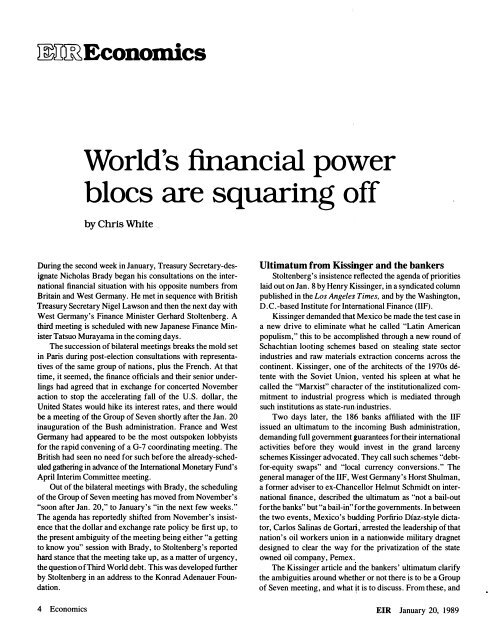View Full Issue - Executive Intelligence Review
View Full Issue - Executive Intelligence Review
View Full Issue - Executive Intelligence Review
Create successful ePaper yourself
Turn your PDF publications into a flip-book with our unique Google optimized e-Paper software.
mlillEconomics<br />
World's financial power<br />
blocs are squaring off<br />
by Chris White<br />
During the second week in January, Treasury Secretary-designate<br />
Nicholas Brady began his consultations on the international<br />
financial situation with his opposite numbers from<br />
Britain and West Germany. He met in sequence with British<br />
Treasury Secretary Nigel Lawson and then the next day with<br />
West Germany's Finance Minister Gerhard Stoltenberg. A<br />
third meeting is scheduled with new Japanese Finance Minister<br />
Tatsuo Murayama in the coming days.<br />
The succession of bilateral meetings breaks the mold set<br />
in Paris during post-election consultations with representatives<br />
of the same group of nations, plus the French. At that<br />
time, it seemed·, the finance officials and their senior underlings<br />
had agreed that in exchange for concerted November<br />
action to stop the accelerating fall of the U.S. dollar, the<br />
United States would hike its interest rates, and there would<br />
be a meeting of the Group of Seven shortly after the Jan. 20<br />
inauguration of the Bush administration. France and West<br />
Germany had appeared to be the most outspoken lobbyists<br />
for the rapid convening of a G-7 coordinating meeting. The<br />
British had seen no need for such before the already-scheduled<br />
gathering in advance of the Intemational Monetary Fund's<br />
April Interim Committee meeting.<br />
Out of the bilateral meetings with Brady, the scheduling<br />
of the Group of Seven meeting has moved from November's<br />
"soon after Jan. 20," to January's "in the next few weeks."<br />
The agenda has reportedly shifted from November's insistence<br />
that the dollar and exchange rate policy be first up, to<br />
the present ambiguity of the. meeting being either "a getting<br />
to know you" session with Brady, to Stoltenberg's reported<br />
hard stance that the meeting take up, as a matter of urgency,<br />
the question of Third World debt. This was developed further<br />
by Stoltenberg in an address to the Konrad Adenauer Foundation.<br />
4 Economics<br />
Ultimatum from Kissinger and the bankers<br />
Stoltenberg's insistence reflected the agenda of priorities<br />
laid out on Jan. 8 by Henry Kissinger, in a syndicated column<br />
published in the Los Angeles Times, and by the Washington,<br />
D.C.-based Institute for Intl1rnational Finance (IIF).<br />
Kissinger demanded that Mexico be made the test case in<br />
a new drive to eliminate �hat he called "Latin American<br />
populism," this to be accomplished through a new round of<br />
Schachtian looting schemes based on stealing state sector<br />
industries and raw materials extraction concerns across the<br />
continent. Kissinger, one of the architects of the 1970s detente<br />
with the Soviet Union, vented his spleen at what he<br />
called the "Marxist" character of the institutionalized commitment<br />
to industrial progress which is mediated through<br />
such institutions as state-run,industries.<br />
Two days later, the 186 banks affiliated with the IIF<br />
issued an ultimatum to the incoming Bush administration,<br />
demanding full government guarantees for their international<br />
activities before they would invest in the grand larceny<br />
schemes KiSSinger advocated. They call such schemes "debtfor-equity<br />
swaps" and "local currency conversions." The<br />
general manager of the IIF, West Germany's Horst Shulman,<br />
a former adviser to ex-Chancellor Helmut Schmidt on international<br />
finance, described the ultimatum as "not a bail-out<br />
for the banks" but "a bail-in" for the governments. In between<br />
the two events, Mexico's budding Porfirio Diaz-style dictator,<br />
Carlos Salinas de Gortari, arrested the leadership of that<br />
nation's oil workers union in a nationwide military dragnet<br />
designed to clear the way for the privatization of the state<br />
owned oil company, Pemex.<br />
The Kissinger article and the bankers' ultimatum clarify<br />
the ambiguities around whether or not there is to be a Group<br />
of Seven meeting, and what ft is to discuss. From these, and<br />
EIR January 20, 1989

















